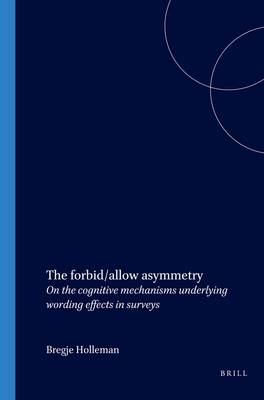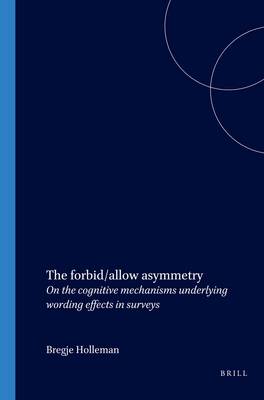
- Retrait en 2 heures
- Assortiment impressionnant
- Paiement sécurisé
- Toujours un magasin près de chez vous
- Retrait gratuit dans votre magasin Club
- 7.000.0000 titres dans notre catalogue
- Payer en toute sécurité
- Toujours un magasin près de chez vous
The Forbid/Allow Asymmetry
On the Cognitive Mechanisms Underlying Wording Effects in Surveys
Bregje Holleman
102,45 €
+ 204 points
Description
Questionnaires are widely used in the social sciences and very often survey data form the basis for governmental and commercial planning or evaluation. Yet the quality of survey data is not attested to, since a large variety of factors in the language-use situation prove to influence the answers unintentionally. The forbid/allow asymmetry is a well-known example of this: when respondents are asked whether something should be forbidden, about 50% may answer 'yes, forbid' - whereas an equivalent question phrased with the verb 'to allow' could well cause up to 75% of the respondents to answer 'no, it should not be allowed'. Which question wording is preferable to measure respondents' true attitudes? Only when we know why the answers differ, can we decide on that.
This book is the first to apply a systematic cognitive approach to describe the causes of the forbid/allow asymmetry. The question-answering process is unravelled by a variety of experiments and meta-analytic techniques. Analyses reveal that the difference in question wording does not prompt respondents to retrieve different attitudes. Instead, the asymmetry reflects that the question wording causes the response options to be used differently. Because of the qualifying dimensions in the question text, the meanings of 'yes' and 'no' change, as well as the cognitive distance between them.
This study sheds a different light on processes of question-answering and text interpretation. Furthermore, practical advice on questionnaire design and on the interpretation of survey data is given on the basis of these new insights.
This book is the first to apply a systematic cognitive approach to describe the causes of the forbid/allow asymmetry. The question-answering process is unravelled by a variety of experiments and meta-analytic techniques. Analyses reveal that the difference in question wording does not prompt respondents to retrieve different attitudes. Instead, the asymmetry reflects that the question wording causes the response options to be used differently. Because of the qualifying dimensions in the question text, the meanings of 'yes' and 'no' change, as well as the cognitive distance between them.
This study sheds a different light on processes of question-answering and text interpretation. Furthermore, practical advice on questionnaire design and on the interpretation of survey data is given on the basis of these new insights.
Spécifications
Parties prenantes
- Auteur(s) :
- Editeur:
Contenu
- Nombre de pages :
- 260
- Langue:
- Anglais
- Collection :
- Tome:
- n° 16
Caractéristiques
- EAN:
- 9789042013414
- Date de parution :
- 01-01-00
- Format:
- Livre broché
- Format numérique:
- Trade paperback (VS)
- Dimensions :
- 150 mm x 220 mm

Seulement chez Librairie Club
+ 204 points sur votre carte client de Librairie Club
Les avis
Nous publions uniquement les avis qui respectent les conditions requises. Consultez nos conditions pour les avis.






